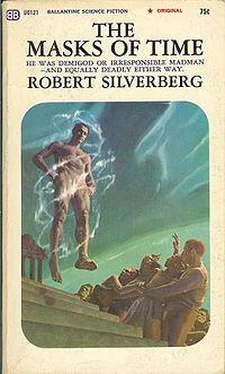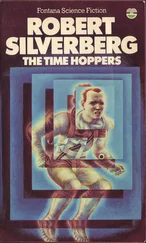Robert Silverberg - The Masks of Time
Здесь есть возможность читать онлайн «Robert Silverberg - The Masks of Time» весь текст электронной книги совершенно бесплатно (целиком полную версию без сокращений). В некоторых случаях можно слушать аудио, скачать через торрент в формате fb2 и присутствует краткое содержание. Год выпуска: 1968, ISBN: 1968, Издательство: Ballantine Books, Жанр: Фантастика и фэнтези, на английском языке. Описание произведения, (предисловие) а так же отзывы посетителей доступны на портале библиотеки ЛибКат.
- Название:The Masks of Time
- Автор:
- Издательство:Ballantine Books
- Жанр:
- Год:1968
- ISBN:0345234464
- Рейтинг книги:3 / 5. Голосов: 1
-
Избранное:Добавить в избранное
- Отзывы:
-
Ваша оценка:
- 60
- 1
- 2
- 3
- 4
- 5
The Masks of Time: краткое содержание, описание и аннотация
Предлагаем к чтению аннотацию, описание, краткое содержание или предисловие (зависит от того, что написал сам автор книги «The Masks of Time»). Если вы не нашли необходимую информацию о книге — напишите в комментариях, мы постараемся отыскать её.
The Masks of Time — читать онлайн бесплатно полную книгу (весь текст) целиком
Ниже представлен текст книги, разбитый по страницам. Система сохранения места последней прочитанной страницы, позволяет с удобством читать онлайн бесплатно книгу «The Masks of Time», без необходимости каждый раз заново искать на чём Вы остановились. Поставьте закладку, и сможете в любой момент перейти на страницу, на которой закончили чтение.
Интервал:
Закладка:
I thought of falling bodies and pink thighs in a Tivoli dance hall. “They’re likely to be disappointed,” I said, “if they think that Vornan’s going to help them. From what I’ve seen, he’s strictly on the side of entropy.”
“He may change when he sees what power he can wield over them.”
Of all the many frightening things I saw and heard those first days, Helen McIlwain’s calm words were, as I look back, the most terrifying of all.
Of course, the government had had long experience in importing celebrities. Vornan’s arrival was announced for one runway, and then he came in on another, at the far end of the airport, while a dummy rocket sent up for the purpose from Mexico City glided in for a landing where the man from 2999 was supposed to come down. The police contained the mob fairly well, considering. But as the two groups rushed forth onto the field, they coalesced, the Apocalyptists mingling with the disciples of Vornan, and then, abruptly, it was impossible to know which group was which. The camera zeroed in on one throbbing mass of humanity and retreated just as quickly upon the discovery that a rape was in progress beneath all the confusion. Thousands of figures swarmed about the rocket, whose dull blue sides gleamed temptingly in the feeble January sunlight; meanwhile Vornan was quietly being extracted from the true rocket a mile away. Via helicopter and transportation pod he came to us, while tanks of foam were emptied on the strugglers surrounding the blue rocket. Kralick phoned ahead to let us know that they were bringing Vornan to the hotel suite that was serving as our New York headquarters.
I felt a moment of sudden blinding panic as Vornan-19 approached the room.
How can I convey the intensity of that feeling in words? Can I say that for an instant the moorings of the universe seemed to loosen, so that the Earth was drifting free in the void? Can I say that I felt myself wandering in a world without reason, without structure, without coherence? I mean this quite seriously: it was a moment of utter fear. My various ironic, wry, mocking, detached poses deserted me; and I was left without the armor of cynicism, naked in a withering gale, facing the prospect that I was about to meet a wanderer out of time.
The fear I felt was the fear that abstraction was turning to reality. One can talk a great deal about time-reversal, one can even shove a few electrons a brief distance into the past, and yet it all remains essentially abstract. I have not seen an electron, nor can I tell you where one finds the past. Now, abruptly, the fabric of the cosmos had been ripped apart and a chilly wind blew upon me out of the future; though I tried to recapture my old skepticism, I found it was impossible. God help me. I believed that Vornan was authentic. His charisma preceded him into the room, converting me in advance. What price hardheadedness? I was jelly before he appeared. Helen McIlwain stood enraptured. Fields fidgeted; Kolff and Heyman looked troubled; even Aster’s icy shield was penetrated. Whatever I was feeling, they were feeling it too.
Vornan-19 entered.
I had seen him on the screens so often in the past two weeks that I felt I knew him; but when he came among us, I found myself in the presence of a being so alien that he was unknowable. And traces of that feeling lingered during the months that followed, so that Vornan was always something apart.
He was even shorter than I had expected him to be, no more than an inch or two taller than Aster Mikkelsen. In a room of big men he looked overwhelmed, with towering Kralick at one side and mountainous Kolff at the other. Yet he was in perfect command. He drew his eyes over all of us in one smooth gesture and said, ”This is most kind of you, to take this trouble for me. I am flattered.”
God help me. I believed.
We are each of us the summaries of the events of our time, the great and the small. Our patterns of thought, our clusters of prejudices, these things are determined for us by the distillate of happenings that we inhale with our every breath. I have been shaped by the small wars of my lifetime, by the detonations of atomic weapons in my childhood, by the trauma of the Kennedy assassination, by the extinction of the Atlantic oyster, by the words my first woman spoke to me in her moment of ecstasy, by the triumph of the computer, by the tingle of Arizona sunlight on my bare skin, and much else. When I deal with other human beings, I know that I have a kinship with them, that they have been shaped by some of the events that fashioned my soul, that we have at least certain points of common reference.
What had shaped Vornan?
None of the things that had shaped me. I found grounds for awe in that. The matrix from which he came was wholly different from mine. A world that spoke other languages, that had had ten centuries of further history, that had undergone unimaginable alterations of culture and motive — that was the world from which he came. Through my mind flashed an imagined view of Vornan’s world, an idealized world of green fields and gleaming towers, of controlled weather and vacations in the stars, of incomprehensible concepts and inconceivable advances; and I knew that whatever I imagined would fall short of the reality, that I had no points of reference to share with him at all.
I told myself that I was being a fool to give way to such fear.
I told myself that this man was of my own time, a clever manipulator of his fellow mortals.
I fought to recover my defensive skepticism. I failed.
We introduced ourselves to Vornan. He stood in the middle of the room, faintly supercilious, listening as we recited our scientific specialties to him. The philologist, the biochemist, the anthropologist, the historian, and the psychologist announced themselves in turn. I said, “I’m a physicist specializing in time-reversal phenomena,” and waited.
Vornan-19 replied, “How remarkable. You’ve discovered time-reversal so early in civilization! We must talk about this some time soon, Sir Garfield.”
Heyman stepped forward and barked, “What do you mean, ‘so early in civilization’? If you think we’re a pack of sweaty savages, you—”
“Franz,” Kolff muttered, catching Heyman’s arm, and I found out what the F. in “F. Richard Heyman” stood for. Heyman subsided stonily. Kralick scowled at him. One did not welcome a guest, however suspect a guest, by snarling defiance.
Kralick said, “We’ve arranged for a tour of the financial district for tomorrow morning. The rest of this day, thought, could be spent at liberty, just relaxing. Does that sound all—”
Vornan was paying no attention. He had moved in a curious gliding way across the room and was eye-to-eye with Aster Mikkelsen. Quite softly he said, “I regret that my body is soiled from long hours of traveling. I wish to cleanse myself. Would you do me the honor of bathing with me?”
We gaped. We were all braced for Vornan’s habit of making outrageous requests, but we hadn’t expected him to try anything so soon, and not with Aster. Morton Fields went rigid and swung around like a man of flint, clearly groping for a way to rescue Aster from her predicament. But Aster needed no rescuing. She accepted Vornan’s invitation to share a bathroom with him gracefully and with no sign of hesitation. Helen grinned. Kolff winked. Fields spluttered. Vornan made a little bow — flexing his knees as well as his spine, as though he did not really know how bows were accomplished — and ushered Aster briskly from the room. It had happened so fast that we were totally stunned.
Fields managed to say finally, “We can’t let him do that!”
“Aster didn’t object.” Helen pointed out. “It was her decision.”
Heyman pounded his hand into his fist. “I resign!” he boomed. “This is an absurdity! I withdraw entirely!”
Читать дальшеИнтервал:
Закладка:
Похожие книги на «The Masks of Time»
Представляем Вашему вниманию похожие книги на «The Masks of Time» списком для выбора. Мы отобрали схожую по названию и смыслу литературу в надежде предоставить читателям больше вариантов отыскать новые, интересные, ещё непрочитанные произведения.
Обсуждение, отзывы о книге «The Masks of Time» и просто собственные мнения читателей. Оставьте ваши комментарии, напишите, что Вы думаете о произведении, его смысле или главных героях. Укажите что конкретно понравилось, а что нет, и почему Вы так считаете.












